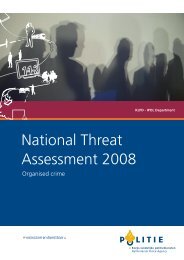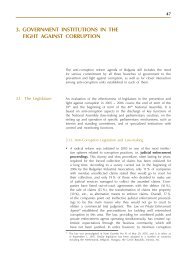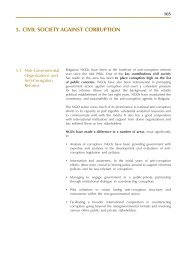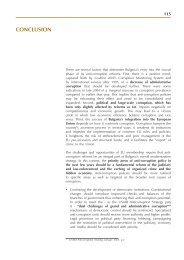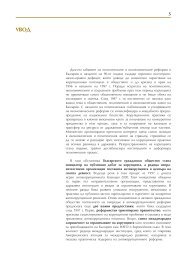Assessing the Effectiveness of Organized Crime Control Strategies ...
Assessing the Effectiveness of Organized Crime Control Strategies ...
Assessing the Effectiveness of Organized Crime Control Strategies ...
Create successful ePaper yourself
Turn your PDF publications into a flip-book with our unique Google optimized e-Paper software.
<strong>Assessing</strong> <strong>the</strong> <strong>Effectiveness</strong> <strong>of</strong> <strong>Organized</strong> <strong>Crime</strong> <strong>Control</strong> <strong>Strategies</strong>:<br />
A Review <strong>of</strong> <strong>the</strong> Literature<br />
This review did not uncover any evaluation <strong>of</strong> any <strong>of</strong> <strong>the</strong>se programs. Beare (1996:194) states<br />
that <strong>the</strong> current version <strong>of</strong> <strong>the</strong> program is under-funded and lacks “<strong>the</strong> infrastructure <strong>of</strong> training,<br />
support services, and policies needed to support <strong>the</strong> Canada-wide operation.” For example,<br />
Canada lacks <strong>the</strong> facilities to house informers who are incarcerated, especially at <strong>the</strong> provincial<br />
level and in <strong>the</strong> case <strong>of</strong> women.<br />
The RCMP’s program costs over $3 million and protects 80-100 witnesses at any one time.<br />
About half <strong>of</strong> <strong>the</strong>se witnesses have provided testimony in relation to OC cases. As with <strong>the</strong><br />
American program, a number <strong>of</strong> lawsuits have been filed against <strong>the</strong> RCMP for allegedly failing<br />
to provide adequate protection for witnesses and <strong>the</strong>ir families, and for failing to provide new<br />
identities (Ha, 1995).<br />
The United Kingdom, too, has no national witness protection program; however, an increasing<br />
number <strong>of</strong> police forces have established specialized units to protect witnesses (Fyfe and McKay,<br />
2000). Witness relocation tends to be an option for just those witnesses facing <strong>the</strong> highest level<br />
<strong>of</strong> danger. An evaluation <strong>of</strong> <strong>the</strong> Strathclyde program in Scotland revealed that <strong>the</strong> average cost<br />
per case was considerably lower than o<strong>the</strong>r British programs-$6,000 as opposed to $20,000-<br />
$100,000. This difference was attributed to variations in <strong>the</strong> length <strong>of</strong> time witnesses spend in<br />
temporary accommodations, variations in benefits, and <strong>the</strong> more expeditious processing <strong>of</strong> cases<br />
in Scotland.<br />
Police <strong>of</strong>ficers, prosecutors, and defence advocates tended to agree that such programs are<br />
invaluable, especially in certain types <strong>of</strong> cases (e.g., drug-related), where <strong>the</strong> presence <strong>of</strong> forensic<br />
evidence means that witness intimidation is one <strong>of</strong> <strong>the</strong> few avenues available to <strong>the</strong> accused and<br />
co-defendants to weaken <strong>the</strong> prosecution’s case (Fyfe and McKay, 2000:289). Prosecutors noted<br />
that, without such programs, witnesses had <strong>of</strong>ten chosen to accept <strong>the</strong> penalties <strong>of</strong> not testifying<br />
ra<strong>the</strong>r than risk serious injury.<br />
These pr<strong>of</strong>essionals noted some concerns with <strong>the</strong>se programs (Fyfe and McKay, 2000). One<br />
concern was that some witnesses, wishing to be relocated, would falsely claim that <strong>the</strong>y were<br />
being threatened. Ano<strong>the</strong>r concern was that relocation would not work, as protected witnesses<br />
would eventually return to <strong>the</strong>ir home area. Defence counsel were apprehensive about <strong>the</strong><br />
prejudicial effect on <strong>the</strong> image <strong>of</strong> defendants <strong>of</strong> indicating in court that <strong>the</strong> witness had entered a<br />
witness protection program.<br />
Witnesses interviewed in <strong>the</strong> Strathclyde study reported facing such incidents as having <strong>the</strong>ir<br />
house gas-bombed, having a shotgun to <strong>the</strong>ir head, being run over by a car, and receiving threats<br />
to <strong>the</strong>ir children. While many were relieved to learn about <strong>the</strong> possibility <strong>of</strong> being relocated,<br />
<strong>the</strong>y were anxious about <strong>the</strong> impending loss <strong>of</strong> contact with family and friends. At this stage,<br />
some witnesses decide against relocation, while o<strong>the</strong>rs feel <strong>the</strong>y have no option. Generally,<br />
witnesses who were relocated felt more secure, but continued to experience anxieties and anger.<br />
The protected witnesses who testified in court (some were not compelled to give evidence due to<br />
changes <strong>of</strong> plea) had praise for <strong>the</strong>ir treatment. They were escorted to and from court and sat in<br />
separate waiting rooms from <strong>the</strong> o<strong>the</strong>r attendees.<br />
34 | Research and Statistics Division / Department <strong>of</strong> Justice Canada



